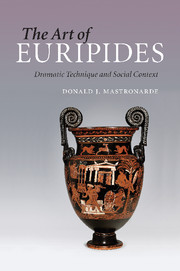Book contents
- Frontmatter
- Contents
- Preface
- Abbreviations and reference system
- 1 Approaching Euripides
- 2 Problems of genre
- 3 Dramatic structures: variety and unity
- 4 The chorus
- 5 The gods
- 6 Rhetoric and character
- 7 Women
- 8 Euripidean males and the limits of autonomy
- Conclusion
- Bibliography
- Index of names and topics
- Index of passages cited
1 - Approaching Euripides
Published online by Cambridge University Press: 04 May 2010
- Frontmatter
- Contents
- Preface
- Abbreviations and reference system
- 1 Approaching Euripides
- 2 Problems of genre
- 3 Dramatic structures: variety and unity
- 4 The chorus
- 5 The gods
- 6 Rhetoric and character
- 7 Women
- 8 Euripidean males and the limits of autonomy
- Conclusion
- Bibliography
- Index of names and topics
- Index of passages cited
Summary
PRE-MODERN RECEPTION
Modern reception and interpretation of the major authors and literary texts of ancient Greece are heavily conditioned, and often distorted, by the long history of anecdote, criticism, pedagogy, and scholarship that has accreted around them, and there are few authors to whom this applies more forcefully than to Euripides. It is indispensable, therefore, as a preliminary step in approaching the works of Euripides, to take account of the long tradition of reception and judgment to which the plays have been subjected. Such an accounting will reveal several important potentialities inherent in his dramas as well as the agendas and preferences of the various readers and audiences, and it ought to help us move beyond some of the commonplaces that continue to influence the appreciation of his work.
A thorough treatment of the reception of Euripides would require a whole volume to itself. For the purposes of this book, some highlights will have to suffice. We may begin with the earliest stages of that reception, those from antiquity, which have had the longest span of direct and indirect influence: the judgments about Euripides' themes and styles conveyed in comic form in the plays of Aristophanes; the strictures on his dramatic technique that emerge as obiter dicta in Aristotle's Poetics; the biographical tradition about the poet himself; and the scholia and prefatory material transmitted with select plays in the medieval tradition of the extant plays.
- Type
- Chapter
- Information
- The Art of EuripidesDramatic Technique and Social Context, pp. 1 - 43Publisher: Cambridge University PressPrint publication year: 2010



